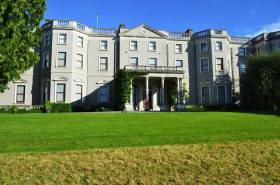Displaying items by tag: Davitt Walsh
#Awards - Minister for Transport, Tourism and Sport Shane Ross presented the National Marine Gallantry and Meritorious Service Awards 2016 at a ceremony in Farmleigh House on Friday evening (14 October)
Minister Ross praised the “courageous achievements and service of this group of brave Irish men and women who have faced crises and dug deep, offering their skills and in many cases placing themselves in danger in order that others might be safe on our waterways.”
Pausing to remember those who lost their lives at sea since the previous awards in 2014, Minister Ross spoke of the tragic death of Irish Coast Guard volunteer Caitríona Lucas last month, describing her as “a courageous and heroic woman who made the ultimate sacrifice while in the service of others.”
Among this year’s recipients was Davitt Walsh, who in March rescued a four-month-old baby from the car that slipped into the water from Buncrana pier, claiming the lives of five members of the same family.
The 2016 award recipients are as follows:
- Davitt Walsh – Michael Heffernan Gold Medal for Marine Gallantry
- Gary Robertson – Michael Heffernan Gold Medal for Marine Gallantry
- Skerries Coast Guard Unit – Marine Ministerial Letter of Appreciation for Meritorious Service
- Dean Coleman – Marine Ministerial Letter of Appreciation for Meritorious Service
- Gavin Byrne – Marine Ministerial Letter of Appreciation for Meritorious Service
- Brian Kehoe, Ruairí Nunn, Sam Nunn and Niall McGee – Michael Heffernan Bronze Medal for Marine Gallantry
- The crew of Castletownbere RNLI – Marine Ministerial Letter of Appreciation for Meritorious Service
- Charlie Hennigar – Michael Heffernan Bronze Medal for Marine Gallantry
- The crew of Rescue 116, Dublin Airport – Marine Ministerial Letter of Appreciation for Meritorious Service
- Richard Desay – Marine Meritorious Service Medal
- The officers and crew of Lough Swilly RNLI – Marine Ministerial Letter of Appreciation for Meritorious Service
- Dean Tracey and Paul Dolan – Michael Heffernan Bronze Medal for Marine Gallantry
- The crew of Kinsale RNLI – Marine Ministerial Letter of Appreciation for Meritorious Service
The awards are to recognise outstanding acts of courage, heroism, skill and initiative in the context of marine emergency incidents. The scheme also recognises exceptional dedication to duty in the execution of Ireland’s marine emergency response.
The Marine Gallantry award is presented in the form of a medal, called the Michael Heffernan Medal for Marine Gallantry in memory of an individual who lost his life during a marine incident a number of years ago. Three levels of medal may be awarded — gold, silver or bronze — based on the level of gallantry involved. The medal is awarded in gold, silver or bronze.
A second award, Marine Meritorious Service Medal, may be awarded where outstanding meritorious service has been provided to, or within the remit of, the Irish Coast Guard. The person must have demonstrated exceptional dedication to duty, coupled with skill and initiative, in the execution of the service being provided.
A Marine Ministerial Letter of Appreciation may be awarded for meritorious service where outstanding dedication to duty over a career of service can be demonstrated, or for an act of particular meritorious dedication, showing skill and initiative, but which is not of an order for receipt of a Meritorious Service or Marine Gallantry medal.
The National Marine Gallantry and Meritorious Service Awards Committee is chaired by Bryan Dobson of RTÉ. Members of the committee include representatives of the Irish Sailing Association; Irish Water Safety; Irish Harbour Masters Association; Bord Iascaigh Mhara; Department of Transport, Tourism and Sport; as well as other independent members.
The first award ceremony took place in February 1999 and the awards ceremony was last held on 23 October 2014.





























































